 |
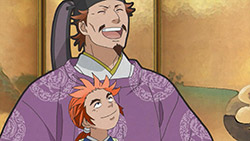 |
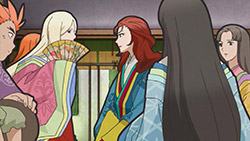 |
 |
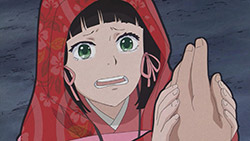 |
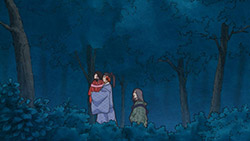 |
 |
 |
 |
 |
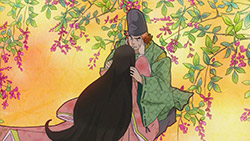 |
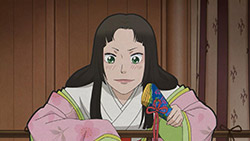 |
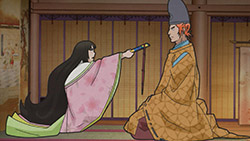 |
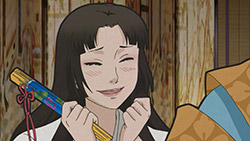 |
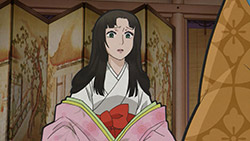 |
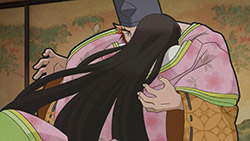 |
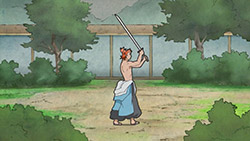 |
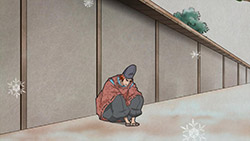 |
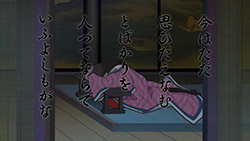 |
 |
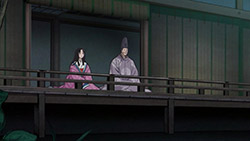 |
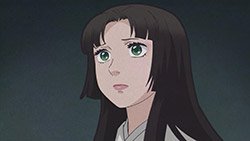 |
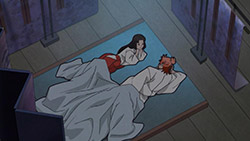 |
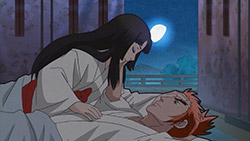 |
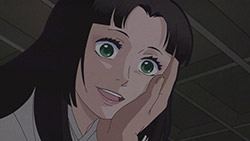 |
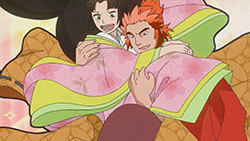 |
 |
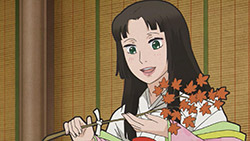 |
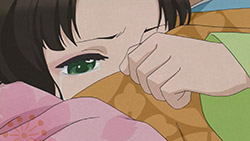 |
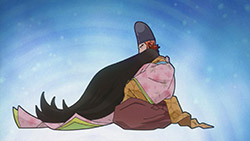 |
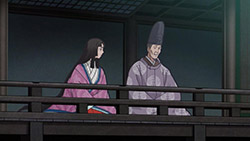 |
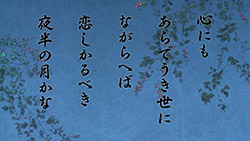 |
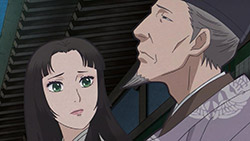 |
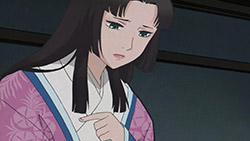 |
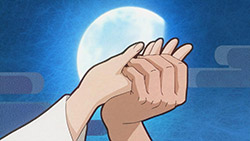 |
 |
「道雅と当子 左京大夫道雅/うき世の月 三条院」 (Michinasa to Masako Sakyou Taifu Michinasa/Ukise no Tsuki Sanjou In)
“Michinasa and Msako Minister of Left Kyoto Michimasa/Midnight Moon Former Emperor Sanjou”
No show is complete without a healthy dose of HanaKana! The kind of girlish and effervescent personality Masako has makes better use of Hanazawa Kana’s than some of her demure, passive roles do, and the dynamics behind her character are captured quite well, which leads to a pleasant viewing experience in terms of audio. Establishing any sort of rapport with the audience was critical for Masako’s character, as her childish idealism is not everyone’s cup of tea – it’s quite easy to misconstrue her character as immature and simple, especially in contrast to a more cynical personality like that of Michimasa’s (Kiuchi Hidenobu).
In terms of romantic development, this episode offered the clearest explanation of why the two lovers can’t be together. With Nagiko and Sanetaka/Yukinari, their parting was centered around the circumstances that stood in their way rather than an issue that stemmed from their individual personalities. It was missed timing, particularly in Yukinari’s case – and no matter what some may say, half of love is timing. Masako and Michimasa, however, present a case where it’s more the conflicts that arise from their persons driving the separation rather than the situation at hand. This isn’t immediately apparent since their difference in social status is stressed throughout the episode, but there are multiple instances where it’s clear even without that obstacle, they could never have worked in the long run.
It’s quite obvious they do love each other, and it might have even been possible for them to find happiness if they had been born into different families. Whether or not that happiness would be long-lasting however, is another issue entirely. Masako, while endearing, is very much a princess at heart, building upon an infatuation that began in her childhood. There is nothing wrong with that, but there’s a sense that the fairytale fantasies she dreamt of as a child is still influencing her thoughts as an adult. To her, all she needs is love – a belief born from her own inherent personality as well as her upbringing. Michimasa, on the other hand, feels much older and realistic in his way of thinking, which contrasts sharply to the image of a white knight Masako imagines. At the core, both of their values are too different at this point to carry them very far; Masako may be able to subsist on love alone, but that’s not something Michimasa is willing to do at this point – personal honor comes first. He may regret that he let her go, and some may label it inevitable and an impossible situation to fix, but he seemed to give up awfully fast. It’s in indication of one of two things: he doesn’t feel himself worthy, or he doesn’t feel strongly enough to try and amend the situation by at least trying in any possible to end things in a kinder manner. Both possibilities stem from his pessimism, and this manner of thinking is somewhat too dark for Masako. She does need to know that reality and fairytales can’t exist in the same world, but at the same time she needs someone who can respect her idealism, who at least the courage to part with her face to face. In the same vein, while Michimasa does need an optimistic partner, someone more grounded and less bubbly will probably be a better fit for him.
The biggest thing that highlighted their difference was probably when Masako suggests they use their marriage to help secure Michimasa’s future – it’s a cringe-worthy moment, rendered convoluted by the fact there’s no malice behind her words. She honestly means well, but the viewers know this is not the best way to respect Michimasa’s pride, even when disregarding what the public may think of them. As oblivious as the offer may seem, it’s hard to completely fault Masako for it since she clearly still has a lot of growing up to do, and the show itself doesn’t seem to want to demonize her behavior; in the end she does realize what she did was wrong, and that her words didn’t mean the same thing to her as it did to Michimasa.
I suppose it’s interesting to note that while Michimasa appears the same from the beginning to end, Masako is first shown as a child. There is an obvious age difference (exactly how many years is unknown), but I still find it an interesting choice. Intentional or not, the depiction goes hand-in-hand with her growth throughout the episode, and it also conveys a lot about the two individuals. Not only does Michimasa appear physically the same, he remains unchanging in terms of personality as well. If this was done on purpose, many props to the directing – it’s another way to present their contrast without hammering it into the dialogue like a jackhammer, and I appreciate Uta Koi’s rather mature way of treating its viewers. The show’s underlying messages are always quite easy to pick out, but the evidence they present to fortify that message are quite layered; some jump out, while some remain a slight subtlety, much like the casting in last week’s episode, or for a more visual example, Yukinari’s posture in episode 9.
Michimasa and Masako’s relationship was pleasant to watch though, managing to be rather sweet and charming; for the time it lasted, they were both happy, which is always the most important thing.
Full-length images: 2, 3, 6, 7, 9, 12, 15, 17, 18, 21, 22, 23, 26, 31, 32, 34, 36.
Preview
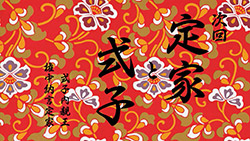 |

i love this show, it reminds me natsume yuujinchou, but i assume it have “some” historical veracity in it
and so we only have the last episode for our narrator Teika. i’m interested to know what kind of whirlwind love story he has. at the same time, i’m dreading the end of UtaKoi too. >_<.“
Yes it will be interesting to see the woman he is paired with. (I know nothing of Japans history)
I think, and this might just be the romantic in me, that there’s a chance that Michimasa and Masako would’ve stayed together they not been kept apart.
The old proverb “Opposites Attract” refers to how each member of a couple compensates for whatever the other may lack, be they qualities, personality, or abilities. So in that regard, I can see Michimasa compensating for Masako’s idealism with his realism. So I wouldn’t write the two off as being unable to work in the long run, at least in my opinion.
Can we have a love story that ends well now? Pleaaaaaaase 🙁
So sad there’s only one episode left 🙁 And from the opening I can’t help but think it’s going to be a tragedy again.